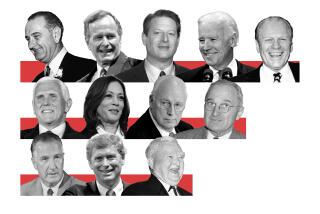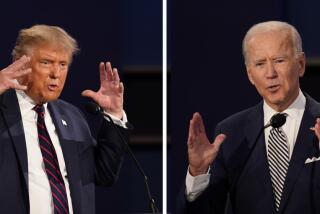Dukakis, Jackson Face Task of Forging Alliance in Party
- Share via
The campaign managers for Democratic presidential candidates Michael S. Dukakis and the Rev. Jesse Jackson won no secret-agent awards for their bungled first attempt to hold a private meeting.
The two political rivals were quietly conferring over breakfast last month in the corner of an ersatz-French bistro in Washington’s sprawling Omni Shoreham Hotel when a reporter found them and asked: “Why are you meeting?”
“We were both hungry,” Dukakis’ campaign manager, Susan Estrich, replied tersely.
“The most serious thing we had to decide was whether to order from the menu or the buffet,” Jackson’s campaign manager, Gerald F. Austin, insisted later.
Face Serious Challenges
In reality, the campaign managers for the two surviving Democratic candidates faced more serious challenges than choosing croissants--and still do.
Although Dukakis is poised to win the nomination without Jackson’s delegates, party leaders know that the Massachusetts governor cannot win the November election without Jackson’s voters. And the two competing candidates, the Democrats’ oddest couple, have yet to forge a working political alliance to ensure that support.
By all accounts, the candidates’ political dilemmas overshadow their personal differences. Aides say Dukakis has to reach out to Jackson and his supporters without alienating anxious white ethnic and Jewish voters. Jackson, on the other hand, has to push his liberal political agenda and placate his more fervent followers without jeopardizing his new-found respect and influence as a mainstream political leader.
“Jackson is not going to want to be blamed for inflicting any damage on Democratic chances in November,” said Dr. Milton Morris, research director at the Joint Center for Political Studies, a Washington group that focuses on black politics. “He’s an insider now.”
Opens Key Dialogue
With stakes that high, aides to both candidates say the first official campaign-to-campaign meeting last month marked a watershed of sorts. It opened a critical line of communication between the rival camps. “We talk once or twice a week, not just to touch base but for rumor control,” Austin said last week. “It prevents misunderstanding,” Estrich agreed.
The back-channel chat is helping set the stage for a powwow between the chiefs. Dukakis said last week that he hopes to have “more than one private meeting” with Jackson before the final primaries in California and New Jersey on June 7. The candidates have talked by phone after each contest since mid-March and chat informally when their paths cross, but they have not formally sat down.
In an interview, Jackson described his relations with Dukakis as “courteous, respectful, professional. . . . I respect him very much. Like soldiers in a foxhole, relationships improve according to your objective circumstances . . . strange bedfellows in foxholes determined to live together as brothers and not die together as fools.”
“I am not sure they had as close a relationship as he (Jackson) had with some of the others,” said Frank Watkins, Jackson’s political director. “Obviously, there are certain people you hit it off with more than others.
“But this is not tiddlywinks,” Watkins added. “They are running for the highest office in the Free World. It is clearly a competitive situation.”
A Fitting Caveat
Watkins’ caveat is fitting given Jackson’s own recent attacks. He has criticized Dukakis for not preparing a federal budget, for being as “bland” as Vice President George Bush and at one point recently even accused his fellow Democrat of being to the right of President Reagan on Mozambique. Jackson also aired his first negative TV commercial in Ohio, saying Dukakis wanted only to “manage” Reaganomics.
Moreover, Jackson’s representative at a Democratic platform committee hearing last week openly challenged party leaders, telling them that the platform should contain “specific pledges” to raise taxes on the wealthy, cut the military budget and increase spending for social programs. Party Chairman Paul G. Kirk Jr. has advocated a short statement of principles, an approach Dukakis supports.
The Jackson aide at the session, House of Representatives Delegate Walter E. Fauntroy of the District of Columbia, said in a telephone interview afterward that he was “recommending” Jackson’s positions, not making intractable demands. But he added: “It could be a battle. We’re serving notice that we’re prepared to fight it.”
Dukakis’ aides and Democratic National Committee officials calmly say the bickering is within bounds. They see no threat yet that Jackson intends to saddle the Democratic nominee or the party with difficult ideological or political demands.
‘Just Politics’
“All the signs are good,” said Leslie Dach, a Dukakis spokesman. “This is just politics.”
Such equanimity is easy, another aide pointed out, provided Jackson’s attacks from the left continue to cause little visible damage. “Of course, if he keeps up the attacks, and Michael’s negatives start to go up, that could be the end of the positive, comfortable, friendly relationship,” the aide added.
So far, that appears unlikely. Jackson has mixed conciliatory language with his charges, and his aides show little rancor about the Dukakis operation. “They have treated us fairly,” said Watkins, Jackson’s political director.
In any case, the Joint Center’s Morris argued, the candidates should continue their low-caliber public skirmishing, both to boost public interest in the final contests and to keep their supporters enthusiastic. After all, he said, the “difference between them on most issues is not significant.”
“The Dukakis bind is not to appear too cozy to Jackson,” Morris added. “They’ve got to continue some kind of fight here, with Jackson pushing and Dukakis resisting. . . . If (Dukakis) has any hope of reclaiming the white, male electorate, he’s got to remain at a discreet distance from Jackson. He can’t convey the impression he’s caving in to Jackson’s demands. At some point, peace becomes counterproductive.”
Sees Hidden Dangers
By the same reasoning, an aide to Illinois Sen. Paul Simon, who has suspended his campaign for the Democratic presidential nomination, warned that meetings between the two candidates hold hidden dangers. “The nominee ought not to do anything that smacks of a deal, with all the negative connotations, with Jesse Jackson,” said the aide, who asked not to be identified. “He ought to reach out personally to him, he ought to reach out to his voters, but when you make a deal, you make real trouble for the Democratic ticket.”
What kind of deal? Jackson’s supporters are pushing for everything from him as a vice presidential candidate, chairman of the Democratic Party, keynote speaker at the Democratic convention, to veto power on these and other options. Jackson has given no hint of what, if anything, he would expect or want.
Dukakis aides are quick to quiet such speculation. “I think it would be presumptuous now to make Jackson any offers,” said John Dukakis, the candidate’s son and adviser.
Dukakis has said he has not ruled Jackson or anyone else “in or out” for a running mate and would not consider it until after June 7. But few of Dukakis’ advisers are privately promoting Jackson on the ticket. Said one, only partly in jest: “Jesse’s too tall for the short list.”
Jackson staffers hold no illusions. “The vice presidency is extremely unlikely,” one key Jackson aide said.
Little Impact on Blacks
But Dukakis has yet to reach very far for black voters. He campaigned in a handful of black neighborhoods in recent contests, but with little visibility or impact. During the New York primary campaign, for example, he went to the heart of Harlem early one Saturday morning to meet for breakfast with about two dozen black couples in an otherwise deserted state office building.
“I can walk from 110th Street to 155th Street, East Side, West Side, and there’s not a single Dukakis poster in the community,” one attendee, Bob LaPrince, head of the National Council for Culture and Art, complained to the candidate. “All black people are not necessarily for Jesse Jackson.”
Dukakis responded defensively that Jackson was not very active in Astoria, a Greek-American community in Queens that was a Dukakis stronghold. “I know Jesse’s going to get the lion’s share of the black votes,” Dukakis added.
Aides say Dukakis will step up his appeals in coming weeks. He has run radio ads targeted at black voters in several states, and aides say they will seek support more aggressively from black leaders. Only two, former New Orleans Mayor Ernest N. (Dutch) Morial and Detroit Mayor Coleman Young, are now on board.
“The best strategy for us is to reach out to the black community and black leaders in particular to teach them who Michael Dukakis is, and his message of opportunity, his commitment to the politics of inclusion and his strengths as an activist leader,” said Christopher Edley Jr., Dukakis’ issues adviser and the highest-ranking black on Dukakis’ staff. He said he expects Jackson’s supporters “to work for the ticket with enthusiasm.”
Jackson Resisting Talks?
Some evidence suggests that the Dukakis camp has wanted even more private negotiations than are now occurring, but that Jackson’s side has resisted.
“There have been overtures from third parties that they would be anxious to sit down and talk, but my answer was that it was premature,” said Watkins, Jackson’s political director.
But Jack Corrigan, Dukakis’ director of operations, said, “We encourage communication,” but “no one is authorized” to negotiate except the campaign managers and the candidates.
Even if Dukakis and Jackson still are not quite chummy, they appear far friendlier than Democratic rivals in previous years. In 1984, Gary Hart and Walter F. Mondale were such bitter foes that Hart repeatedly rebuffed the idea of serving as Mondale’s running mate. Mondale did not even meet with Jackson, sending his campaign manager instead.
And, in 1980, Jimmy Carter vowed that when Massachusetts Sen. Edward M. Kennedy challenged him, he would “whip his ass.” Kennedy carried the biting memory of that remark to the Democratic convention in New York. As millions watched on TV, he forced the President to chase him around the platform, seeking his embrace for Carter’s ultimately futile reelection campaign.
Dukakis and Jackson, by contrast, appear cordial if not warm. Both sides, for instance, credit the other with running positive campaigns.
Differences in Size, Style
If there are differences, part of that is in size and style: Dukakis is 5 feet, 8 inches tall, cool, correct and cerebral. Jackson towers over him at 6 feet, 2 inches, and is effusive, excited and emotional. Dukakis appears visibly uncomfortable when Jackson grabs him by the shoulders, as he did during a Philadelphia news conference last month, and forces his hand in the air in a joint salute.
Their stiffness is a far cry from the close friendship Jackson struck up with ex-Arizona Gov. Bruce Babbitt, a former Democratic candidate. Early in the campaign, former Babbitt spokesman Michael McCurry recalled, Babbitt was sitting in a dressing room with his eyes closed while his makeup was applied before a televised debate. Feeling something amiss, Babbitt slowly opened one eye.
“Jackson was drawing little happy faces on his cheek,” McCurry recalled with a laugh.
More to Read
Get the L.A. Times Politics newsletter
Deeply reported insights into legislation, politics and policy from Sacramento, Washington and beyond. In your inbox twice per week.
You may occasionally receive promotional content from the Los Angeles Times.











